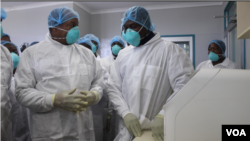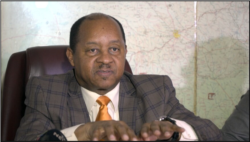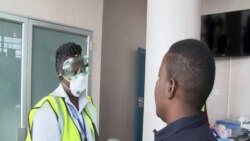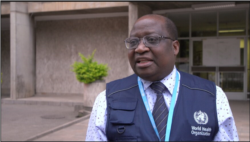As the coronavirus spreads globally, Zimbabwe says it is ready for the infection, despite a struggling health care sector and collapsing economy.
Describing the coronavirus as a “catastrophe which waits us,” Zimbabwe’s Health Minister Obediah Moyo told journalists Monday that the country had learned from previous cholera epidemics and are prepared to tackle the virus, also known as COVID-19.
“Before people come into Zimbabwe, we now have the intelligence to be able to tell from the manifest that an individual would be coming from an infested country. So our surveillance is strong," he said. "We have even made it better by getting the latest in technology of thermal detectors in each and every country you go. It is that determinant which is the first one to trigger off the rest of the alarms. So we are 100 percent certain that we are covered.”
WATCH: Columbus Mavhunga's video report
But Dr. Norman Matara, from Zimbabwe’s Association of Doctors for Human Rights, fears the country’s decrepit healthcare system is not ready for the challenge.
Matara says Zimbabwe lacks the facilities and equipment to tackle a coronavirus epidemic.
“Right now we only have Wilkins Hospital, which is the only health quarantine facility in the country. It does not have adequate resources," he said. "Also we do not have proper ICU beds at Wilkins. With serious infections, what we have noticed in China is that you have to have to undergo assisted breathing with ventilators. Also even protective gear for the health worker themselves, they are actually being placed under a health hazard if they are to face a patient with suspected COVID 19 infection. If that thing comes here it is going to be a disaster.”
To prepare for coronavirus, Zimbabwe has sought assistance from U.N. agencies such as UNICEF and the World Health Organization.
Dr. Wilfred Nkhoma is the acting representative of the WHO in Zimbabwe. He says African countries, including Zimbabwe, must do better to diagnose the virus and prevent it from spreading.
“What the WHO expects which is being implemented in the African region is for the countries to take responsibility for controlling it: Make information known and available to the common public, to eliminate contact, to reduce transmission and to manage cases that have already arrived... We are hoping that the few countries that have reported cases will manage those cases and will be able to contain transmission, but every country needs to be ready and no country should think that they are ready enough at this point," said Nkhoma.
The WHO is urging African states to carry out public information campaigns on virus prevention — such as encouraging hand washing, sanitation, and reporting symptoms.









